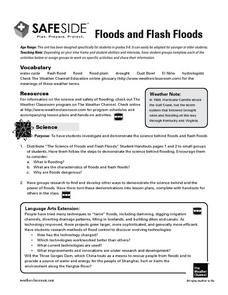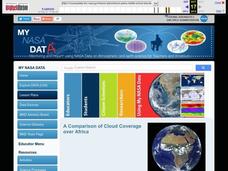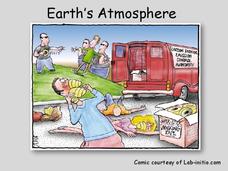Curated OER
Writing a Short Story - Weather
Students use the information they wrote about on the topic they chose in studying About Weather. They then write a short story using the information choosing a theme, setting, characters, and the plot.
Curated OER
Floods and Flash Floods
Junior geologists, hydrologists, or meteorologists simulate what happens during the flooding of a river and demonstrate factors that contribute to flash flooding. This outstanding resource provides a vocabulary list, online resources,...
Curated OER
Soil Investigations
Students examine the basics about soil. In this soil instructional activity students describe the physical properties of soil and explain what soil profile is.
Curated OER
The Global Precipitation Measurement Mission (GPM) Lesson
Introduce your class to one of the ways that technology is benefiting humanity. The Global Precipitation Measurement Mission involves the data collected by nine satellites from different countries with a united focus on studying world...
Curated OER
Rock Cycle
Fourth graders participate in a Rock Cycle game to gain an understanding of the cycles that form metamorphic, sedimentary and igneous rocks.
Curated OER
Time and Cycles - Dendrochronology
Students investigate the lives of trees by examining ring cycles. In this plant life lesson, students identify the field of study known as dendrochronology and discover its history. Students investigate a simulated tree ring...
Curated OER
Processes of the Rock Cycle
Young scholars explore, predict, and create each major rock form (sedimentary, metamorphic, and igneous) with colored modeling clay, discover cycle of rock formation, and examine important relationships of heat and pressure in rock...
Curated OER
The Hudson's Ups and Downs
Fifth graders practice interpreting line graphs of the Hudson River water levels to assess the tides and tidal cycles in the estuary. They explore how weather can affect water levels and tides and observe that high tides and low tides...
Curated OER
To Drink or Not to Drink?
Second graders compare water conservation issues as they impact the past, present, and future in Nevada. In this water conservation lesson, 2nd graders perform and ice experiment to comprehend water collection differences. Students...
Curated OER
How Oceans Affect Climate
Students draw conclusions about how the ocean affects temperature. In this weather lesson plan, students use the Internet to gather data to help them come to a conclusion about how the climate in a certain region is directly affected by...
Curated OER
Clouds
Second graders explore how to identify cloud types by observing clouds. They record data and have fun by applying newly acquired knowledge throughout the curriculum.
NASA
Earth's Global Energy Budget
Introduce your earth science enthusiasts to the earth's energy budget. Teach them using an informative set of slides that include illuminating lecturer's notes, relevant vocabulary, embedded animations, colorful satellite maps, and a...
Curated OER
Regolith Formation
Students study what regolith is and how it contrasts with weathering on Earth. In this weathering lesson plan students divide into groups, hypothesize and confirm their guesses.
Curated OER
A Comparison of Cloud Coverage over Africa
Students identify different climate regions and local weather patterns. In this cloud coverage lesson students use NASA satellite data and import it into Excel.
Maryland Department of Natural Resources
Eyes on Dissolved Oxygen
Learn about the factors that affect the way oxygen dissolves in salt water with a chemistry lab. After studying the molecular structure of water, young scientists figure out how aeration, temperature, and organic waste affect...
Curated OER
Meteorological Predictions
Pupils make a link between prediction and hypothesis in math and science. Based on data collected over one week, students evaluate the predictions of local weather forecasters, compare the predicted outcomes to the actual weather...
Curated OER
Sky and Cloud Windows
Students monitor the weather, clouds, and sky. For this weather lesson, students create a sky and cloud window to focus their sky observations. They write observations in a notebook and include the date, time, cloud cover, types of...
Curated OER
Melting the Ice: Energy Transfer
Students study thermal energy and energy transfer to sea ice processes. In this energy transfer lesson, students make their own ice cream and discuss energy transfer and thermal energy. Students view a radiation overhead and its role in...
Science Geek
Earth's Atmosphere
Ozone gas absorbs the harmful UV-B rays and helps protect humans. An informative presentation begins with the layers of the earth's atmosphere, the pressure and temperature in each of the layers, the ozone layer, the ozone cycle,...
Curated OER
Coqui Frog Populations
Young scholars research Coqui frogs. Students explore the life cycle of coqui frogs and discover how these frogs have become an invasive species in Hawaii.
Curated OER
You're As Old As Ice!
Students study glaciers and their terminology. In this investigative lesson students get into groups and watch the life cycle of a glacier on a web site then answer questions. They will then use play dough to show how...
Curated OER
Home-Made Clouds
Fourth graders witness cloud formation in a jar during a teacher lead simulation. They research, draw and predict weather using information they gather about clouds.
Curated OER
Week 8 - Sea Life
Using a magnifier, mini marine biologists examine the barbules of a bird feather. They swirl the it into a mixture of oil and water and then re-examine the feather. After the activity, discuss how the oily feathers pose a problem to...
Curated OER
Making Sandstone & Conglomerate - An Introduction to Sedimentary Rocks
Students review the three types of rocks and the rock cycle. They participate in an experiment in which they discover the lithification process of sedimentary rocks. They record and share their observations.

























